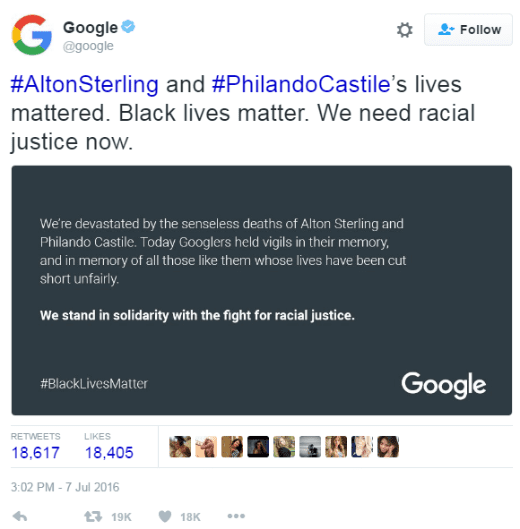Tech companies aren’t holding back from capitalizing on the Black Lives Matter movement.
RELATED:
Global Protests Haven’t Stopped US Police From Killing Black People
When activist Deray McKesson was arrested this week, the headline on the tech industry blog TechCrunch had an article headlined “Black Lives Matter activist Deray McKesson arrested while Periscoping.”
Salesforce CEO and billionaire Marc Benioff tweeted, “Yes that is a @Twitter @blackbirds logo. Amazing to see tech as vehicle for social change. Respect.”, after he observed McKesson was wearing a Twitter t-shirt in the photos of his arrest.

Many were quick to point out the contradictory nature of messages like Benioff’s: while they seemingly rally behind a movement that seeks to dismantle systemic racism against Black people, the tech industry is notorious for their poor records of hiring Black employees.
“That anyone could see a picture of a Black man being arrested for protesting against the wrongful killing of another Black man and respond ‘Hey look at the Twitter logo,’ would be mind-boggling if it happened anywhere else. In the tech industry though, it’s par for the course,” said Erica Joy Baker, a senior engineer at Slack and founding member of Project Include, in an interview with the Guardian.
Former Facebook engineer Justin Edmund also criticized this hypocrisy in a recent post on Medium, writing, “Silicon Valley doesn’t care about Black people. It stands out just how mute Silicon Valley is when it comes to unarmed Black people being shot and killed by cops.”
Big guns like Google and Twitter also tweeted messages of concern about the police killings, and support for Black Lives Matter. Apple CEO Tim Cook referred to the killings as “senseless”, while Spotify launched a special Dr Martin Luther King-themed playlist, and Uber transformed car icons on their apps to peace signs and urged users to take “1 minute to reflect on gun violence” while waiting for their ride.


“A peace sign and ‘a minute to reflect on gun violence’ actively sidesteps the actual issues while appearing to be supportive, when it’s as meaningless as ‘thoughts and prayers’. Similarly, trotting out MLK every time something that affects black people comes up isn’t helping either,” said Baker.

While Baker discussed strategies of showing how the tech industry can effectively engage with the movement, she called on them to stand against racism and policing as forcefully as they do on internet privacy issues.
“As loud and insistent as you can get about Sopa [Stop Online Piracy Act] or some other legislation, get that loud about the fact that this society that claims to treat everyone equally doesn’t even come close,” she said.
Part of the debate on tech engagement with Black Lives Matter has been how central social media networks such as Facebook and Twitter have been to the movement, as they have been for many uprisings in the last decade.
The dissemination of viral videos of police shootings, live documentation of protests and the coordination of movement organizing would have been impossible without it.
That’s probably why Facebook CEO Mark Zuckerberg took to his own Facebook page to both express concern about the recent incidents, but also to highlight the importance of social media that also read as a branding opportunity for his company’s live video feature.

Despite the rising tide of “empathy-washing” initiatives, Salesforce’s Benioff has at least realized what was problematic about his now-deleted tweet.
“Tech CEOs can make aggressive statements that they support Black Lives Matter, but the reality is that until we improve the number of people of color inside tech companies, we really have not done our job,” he told The Guardian.